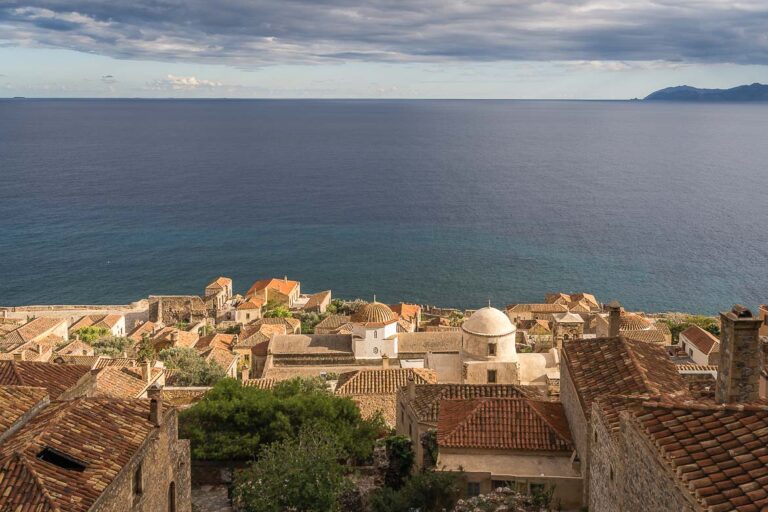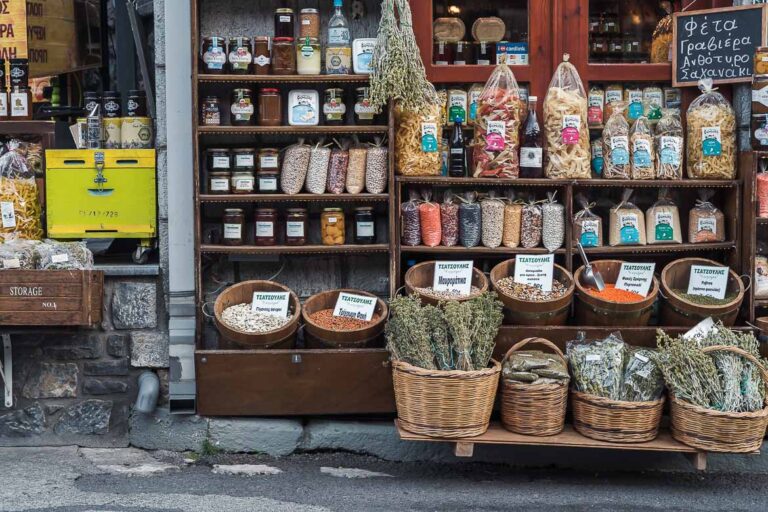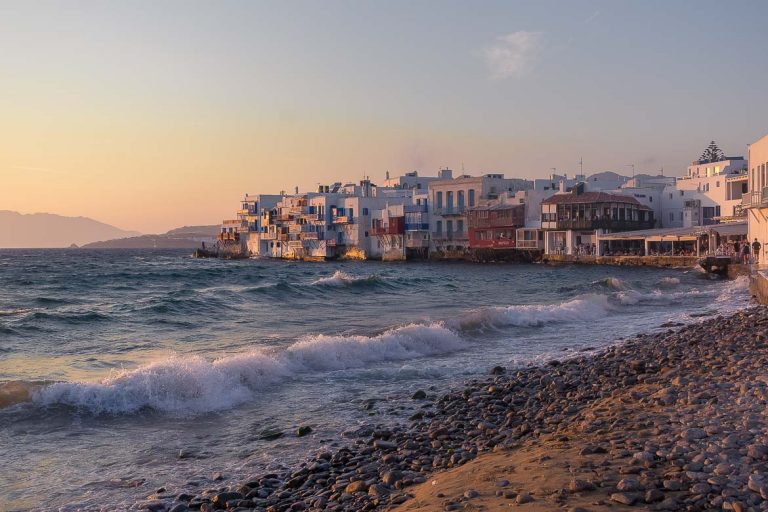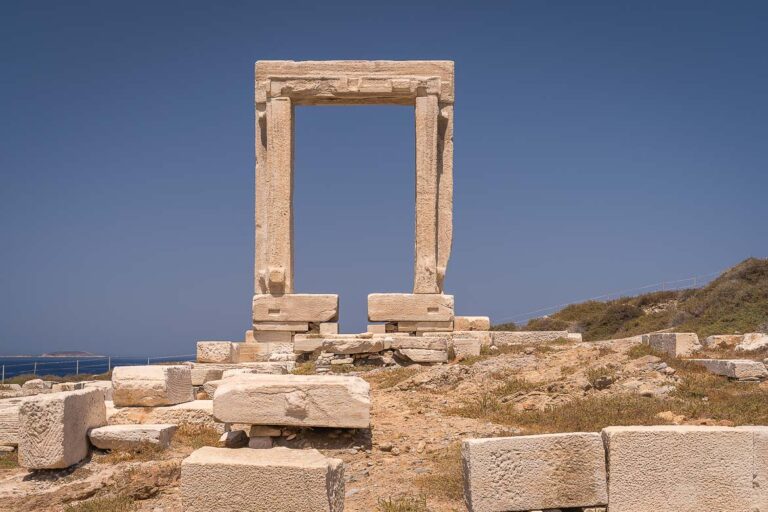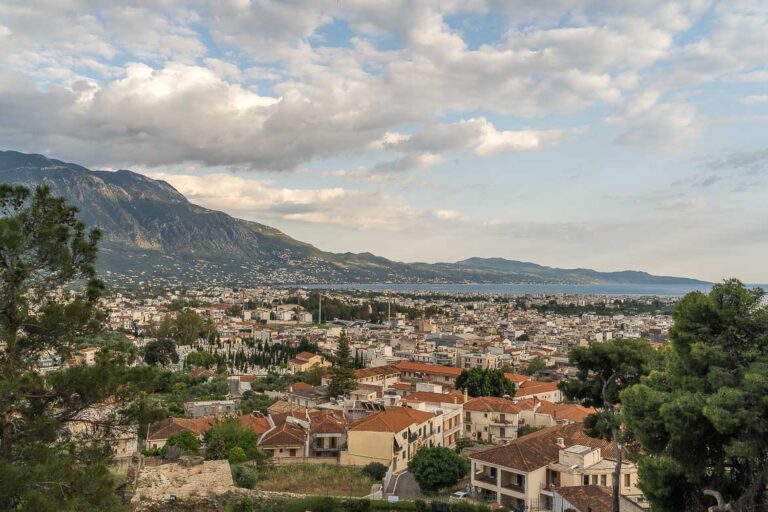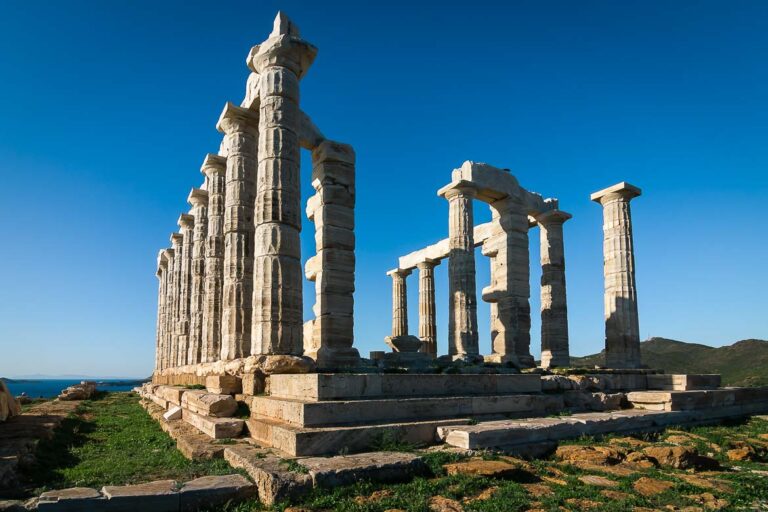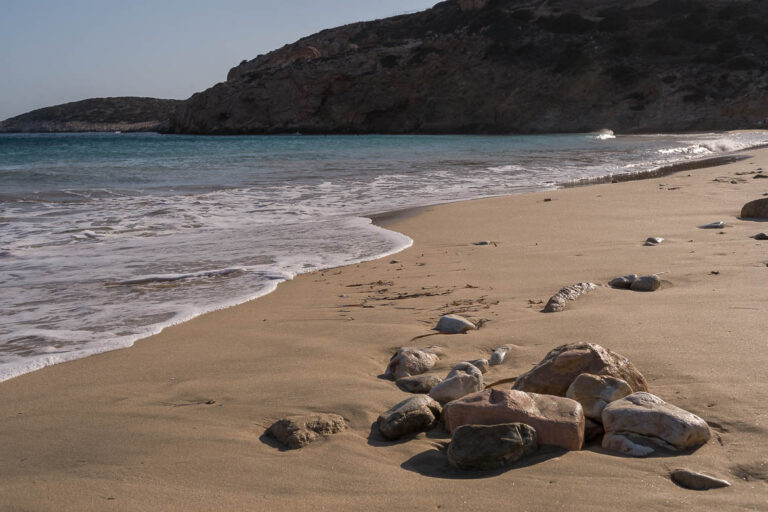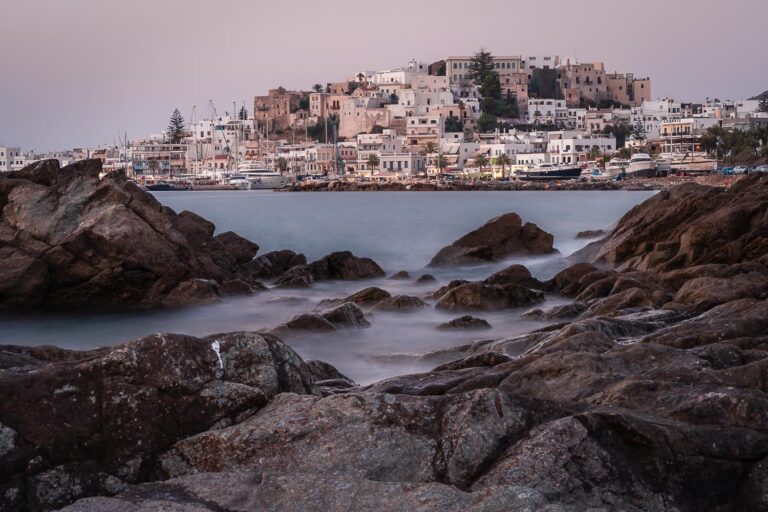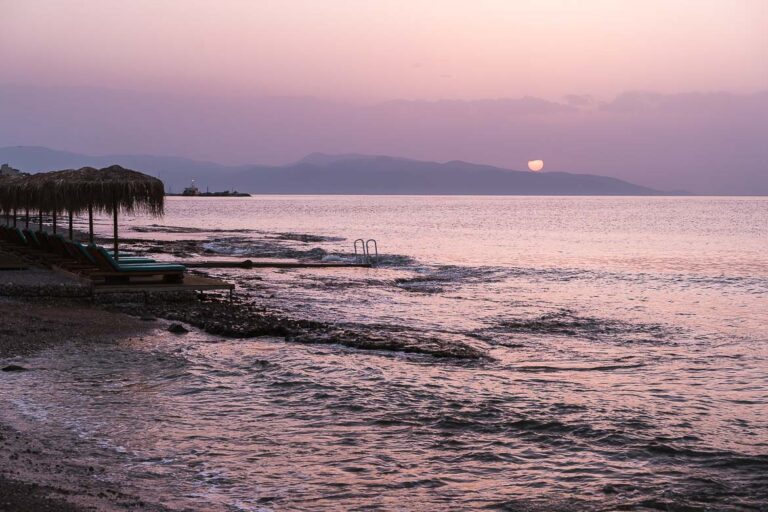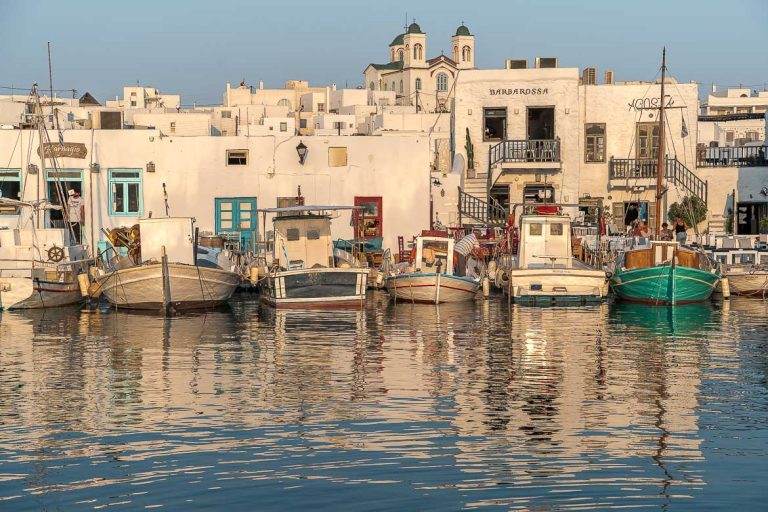
Are you planning a trip to Greece and looking for all the necessary information that will make your life a lot easier? You’ve come to the right place! You are about to read the ultimate Greece Travel Guide, put together by two well-travelled locals on a mission to showcase the best our home country has to offer.
Planning a trip to Greece doesn’t have to be a daunting task. Not even for first-timers. Read on to find out all the essential Greece travel tips, the top things to do in Greece, the best places to visit in Greece and a lot more to plan your trip to Greece down to the last detail!
Some of the links on this page are affiliate ones. This means that if you click through them to make a purchase, we may earn a small commission at no extra cost to you. Learn more.
What Is Greece Known For
So, why visit Greece in the first place? The cradle of Western Civilisation; the birthplace of philosophy, democracy, and the Olympic Games; the blessed land of thousands of islands, 18 UNESCO sites and one of the healthiest cuisines in the world; Greece is all of this and so much more. Greece is famous for its history, culture, natural beauty and diverse traditions.
Travellers to Greece have the unique opportunity to get acquainted with all those elements that are integral to the country’s essence without too much effort. There are archaeological sites, beautiful scenery and places to enjoy delicious food literally everywhere in Greece.

The Ultimate Greece Travel Guide
Where Is Greece
Greece is situated in Southeast Europe. More specifically, it lies on the southernmost tip of the Balkan Peninsula. It shares land borders with Albania, North Macedonia, Bulgaria and Turkey. The Ionian Sea separates it from neighbouring Italy, while the Libyan Sea stands between Greece and the countries of North Africa.
This is why it’s often mentioned that Greece, the country with the longest coastline in the Mediterranean, stands at the crossroads of Europe, Asia and Africa.
Best Time To Visit Greece
The weather in Greece is generally mild. That said, there are many local variations. For instance, summers can be extremely hot in Central Greece and the Aegean Islands, while the mountainous areas in Northern Greece can experience really harsh winters with frequent snowfalls and below-zero temperatures.
That goes to show that, weather-wise, the best time to travel to Greece has to do with the area(s) you plan to include in your Greece itineraries. However, there are several factors to consider when you plan a trip to Greece. These include high and peak seasons, and events or celebrations that you may want to experience when you go to Greece.
As a rule of thumb and taking into consideration all the factors mentioned above, the best months to visit Greece are April to June and September to November.
December, January and February are the coldest months in Greece. Moreover, since Greece is a summer-oriented country, there’s nothing too special about the Christmas season in Greece. Therefore, you won’t be missing out on anything if you decide to spend Christmas somewhere else in Europe.
If you do plan a trip to Greece during these three months, though, you should be heading to some of the country’s largest mainland cities, such as Athens, Thessaloniki, Patras, Volos, Trikala, and Ioannina. There are many things to do there in the winter, such as mingling with locals and experiencing the real Greek vibes.

On the other hand, July and August are the hottest months in Greece. The islands are unbearably crowded and windy during these two months, while the mainland cities can be eerily quiet and torturingly hot. The best places to travel in Greece in July and August are the mountains and the countryside in Central and Northern Greece and the Peloponnese.
June and September are the ideal months to visit the Greek Islands, while October and November are perfect for those who’d like to explore the mainland on a road trip.
As far as events and celebrations go, Easter is one of the best times to visit Greece for the unique traditions that you can witness throughout the country. Easter and the Holy Week in Greece are either in April or May. Therefore, double-check your calendars before planning a trip to Greece. Last but not least, it’s worth attending a performance or two at the Athens & Epidaurus Festival that takes place from June to October each year.
How Long To Stay in Greece
Deciding how long to stay in Greece – or any other destination for that matter – is the most difficult task when planning a trip. Unless you are full-time travellers, it takes a bit of effort and a close look at our tips for travelling more with a 9-5 job to make time for each and every trip you’re dreaming of. That said, fear not. We’re here to help you answer this overwhelming question, too.
If you’re visiting Greece from another European country, which translates to short(er) distances and cheap(er) flights, there’s no need to try and squeeze all the unique places to visit in Greece on the same trip. You can always come back for more.
Therefore, from a long weekend in Athens or Thessaloniki to a week on one of the largest islands or two of the smaller ones to ten days on a road trip across an entire region, such as the Peloponnese or Epirus, your options are endless.
However, things aren’t as easy for people travelling to Greece from other continents. Since there will be a considerable cost for the flights that will get you to Greece, it makes sense to spend as much time in the country as possible and to include many places and things to see in Greece in your itinerary.
So, for those of you planning a trip to Greece from outside of Europe, we believe that two weeks is the absolute minimum time, but three weeks is even better considering that your list of what to do in Greece is probably a long one. That way, you’ll have enough time to have a taste of everything Greece has to offer: the islands, the mainland countryside and the best cities.
Getting To Greece
By Plane
Apart from Athens International Airport, there are more than 15 other international airports scattered across Greece, both on the mainland and the islands.
You can book your flight tickets to Greece here.
By Ferry
You can get to Greece by ferry from Venice, Ancona, Bari, Brindisi and Trieste in Italy. Depending on the port of departure and the season, ferries from Italy reach the ports of Patras, Igoumenitsa and Corfu in Greece. You can also get to Corfu Island in Greece by ferry from Saranda in Albania.
Moreover, some ferries connect the Aegean Coast of Turkey to various Greek Islands, such as Kastellorizo, Rhodes, Kos, Samos, Lesvos, Chios and others, primarily during the summer months.
Plan your trip early and book your ferry tickets to Greece in advance!
By Train
Sadly, all international trains to and from Greece are suspended. Check the official website of Trainose, the only railway company operating in Greece, for any changes.
By Car
People travelling to Greece by car may enter the country via specific border crossings, namely Promachonas, Ormenio and Evzoni. However, this Greece travel information is subject to change and you must always double-check border-crossing updates before embarking on a road trip to Greece.
If you want to discover Greece on a road trip, you can rent a car here!
How To Get Around Greece
Public Transport & Taxis in Athens
Although public transport may not be the best way to get around in the rest of Greece, in Athens it most certainly is. Traffic jams in Athens can get crazy, which means that driving around the capital may end up being too stressful.
The Athens public transport system comprises the Athens Metro, which currently operates lines 1, 2 and 3, the suburban railway, buses, trolleybuses and the tram. You can hop on and off all of the above for 90 minutes with a single ticket that costs 1.20€. If your time in Athens is limited, though, you can hop on the red double-decker sightseeing bus and explore Athens, Piraeus and the Beach Riviera with one ticket.
You can get from Athens Airport to the city centre and Pireaus Port by the Athens Metro. You can have a look at the ticket prices here. However, if you’re travelling as a family or group it makes sense to book a private transfer from the airport to the city centre.
Taxis in Athens are yellow and they are required by law to use a taxi metre. Although there are some designated areas for taxis to line up, it’s common practice to hail a taxi pretty much anywhere you want. To avoid scams or – rarely – worse, you can use Uber.
Public Transport & Taxis in The Rest of The Country
If you decide to rely on public transport and taxis outside of Athens, make sure you check with locals first. Your hotel staff are usually the best people to guide you in terms of local public transport.
Driving in Greece
Planning a road trip in Greece is by far the optimal way to discover the best-hidden gems in Greece. That said, it’s good to keep in mind a few things about driving in Greece before you hit the road. Greece is a right-hand traffic country. Road conditions are generally OK. Yet you may come across some really bad roads filled with potholes, especially in rural areas.
Furthermore, Greek drivers tend to be aggressive and undisciplined, while they enjoy a good fight with other drivers now and then. However, don’t let any of this discourage you from renting a car and enjoying the Greek scenery at your own pace. Keep your eyes on the road, respect road signs and speed limits and just enjoy the ride.
When driving on motorways, you are expected to pay tolls in Greece. Unfortunately, there’s no single website that gives information about all toll stations in Greece. That’s because not all motorways in the country are managed by the same companies. However, there’s this website that calculates fuel and toll costs for you.
Parking in Athens and other large cities can be a nightmare, especially during the day. Watch out for paid parking areas in the city centres to avoid a fine. If you’re not sure, ask a local. In the outskirts of cities, parking is usually free but always check with locals just so you are on the safe side.
Even though most villages and islands have designated areas for free parking, it’s next to impossible to find available parking space during peak season. Again, the safest way to avoid being fined is to ask your hotel staff where to park.
Ferries in Greece
With hundreds of islands to choose from, it’s no surprise that Greece has a wide network of ferries that can make the Greek Island hopping adventure of your dreams come true. You can check ferry schedules and book your tickets here.

Trains in Greece
Unlike ferries, trains in Greece no longer flourish. Although it was possible to roam the country by train in the past, nowadays Greece train travel seems to be on a hiatus. There are only a few daily trains that connect Athens to Thessaloniki and some other cities and villages along the way or via small detours. One of the most popular train trips is the one to Meteora. Check out the Trainose website for more.
The Greek KTEL
The most reliable means to travel across mainland Greece is KTEL, the country’s network of public buses. Depending on where you start your journey from and where you want to go, you should check out the corresponding KTEL website for information about ticket prices and bus schedules. Just google X (place) to Y (place) KTEL (e.g. Athens to Thessaloniki KTEL) and you’ll find the correct website each time.
Domestic Flights in Greece
If you’re wondering how to travel around Greece, remember that domestic flights in Greece only make sense for long distances, especially between the mainland and the islands. For example, if you want to go from Rhodes or Crete to Thessaloniki or Corfu, the best option is to book a domestic flight.
For shorter trips, you’ll be better off either driving or taking the ferry/KTEL bus. Most domestic flights in Greece are operated by Aegean Airlines/Olympic Air, Sky Express and Ryanair.
Best Places To Stay in Greece
When it comes to finding the best accommodation in Greece, the sky’s the limit. From affordable no-frills rooms lost in the Greek countryside to exclusive luxury hotels in the most famous places to visit in Greece, it all comes down to taste, travel style and budget.
In Athens, there are more factors at play when deciding where to stay. Since the Greek capital is a large city, not all of its neighbourhoods are ideal for travellers. Some areas are strictly residential and very far from any places of interest.
Moreover, there’s yet another thing to keep in mind when choosing among countless Athens hotels. That’s no other than safety. Some neighbourhoods in Athens are sketchier than others and you’d want to avoid feeling uncomfortable, especially at night.
The best areas to stay in Athens are Plaka, Koukaki, Kolonaki, Syntagma and Psirri. All of these neighbourhoods are perfectly walkable, they’re near some of the best historical sights and they’re abundant in restaurants, bars, cafés and shops.
Find the best deals and book your stay in Athens here!
When planning a trip to Greece, don’t forget that some special accommodation types can make your Greek trips all the more memorable. For instance, staying at a cave hotel in Santorini, a neoclassical mansion in Athens or a stone tower in Mani are unique experiences that are worth the extra cash.
Read our Santorini accommodation guide!

Things To Know When Planning a Trip To Greece
Greece Visa Requirements
European and US citizens don’t need to apply for a Greece travel visa for either business or tourist purposes. The same goes for citizens of many other countries, too. Here’s a detailed list of all the countries whose citizens need a visa to enter Greece.
Greece Travel Costs
Here are some typical Greece travel expenses to help you get an idea of how much you should put aside for your Greece travel budget. Keep in mind that the Greece travel prices shown here are approximate and they can vary depending on location and time of year. To calculate the exact cost of your trip to Greece, you must research the destinations you’re visiting thoroughly. What’s worth remembering is that hotel prices fluctuate enormously, depending on seasonality.
- Accommodation in a high-rated double room in Athens: 60€ – 100€/night
- Accommodation in a high-rated double room on the Greek Islands (low season): 50€ – 80€/night
- Accommodation in a high-rated double room on the Greek Islands (peak season): 80€ – 200€/night
- Public transport in Athens: 1.20€/90 minutes
- Taxi from Athens Airport to the city centre: 40€ – 55€/ride
- Small/Midsize rental car (low season): 30€ – 60€/day
- Small/Midsize rental car (peak season): 50€ – 100€/day
- Fuel (unleaded gasoline): 1.8€/litre
- Ferry ticket: 20€ – 60€/person
- KTEL Bus ticket: 30€ – 40€/person
- Domestic flight: 50€ – 100€/person
- Wine/beer: 3€ – 6€/glass
- Cocktails: 8€ – 15€/each
- Street food: 5€/person
- Meal with house wine at a traditional restaurant: 15€ – 25€/person
- Meal with bottled wine at a fancy restaurant: 30€ – 50€/person
- Attractions (Museums & Archaeological sites): 5€ – 20€/person

What To Pack For Greece
It’s not uncommon for the weather to be warm enough to go for a swim at Christmas. Nor is it impossible to rain heavily in Greece in July. Also, if you plan to visit any religious sites in Greece, you should know that you are expected to cover up before you enter any of them. That’s when a scarf usually proves life-saving. Therefore, there are four items you should always remember to pack for Greece: a swimsuit, sunglasses, a waterproof jacket and a scarf.
Since you will be walking around a lot in Greece – most probably in hot weather – there’s one more item you should add to your list of Greece travel essentials: a thermal bottle that keeps water cold for up to 24 hours. That way, not only will you never get thirsty, but you’ll also reduce the use of plastic during your Greece vacation.
When packing for Greece in winter, pack warm clothes and, if possible, waterproof shoes. Remember that wearing layers is the right way to go in Greece in winter as temperatures can fluctuate during the day. In the summer, pack cotton or linen clothes, sunscreen with the highest level of protection and a light jacket or sweater.
Money in Greece
The euro is the currency used in Greece. You can withdraw cash at ATMs all over the country. If you plan to visit some of the tiniest islands or villages in Greece, such as the Small Cyclades Islands, check with your hotel to make sure that there’s actually an ATM there. You can use any bank’s ATM in Greece.
That said, make sure you keep clear of the blue and yellow Euronet ATMs unless you want to get ripped off in transaction and exchange rate fees.
One of the most useful things to know before travelling to Greece is that credit cards are widely accepted almost everywhere in Greece, even for small amounts of money.
Order your Wise Card to ensure the best exchange rates here!
Health & Safety in Greece
Tap water in Athens and many other places in Greece is perfectly safe to drink. This is why you should have your aforementioned thermal water bottle with you at all times. Yet, in some places, tap water can be harmful to your health. Always check with your hotel staff about the quality of tap water in the area you’re staying.
Smoking isn’t allowed indoors but it is outdoors. Don’t be surprised if you find yourselves surrounded by clouds of smoke while eating or drinking outside or on the ferry’s deck or the beach. Wherever there’s no roof above your heads or walls around you, smoking is allowed.
People with disabilities should plan their trips to Greece well in advance because there aren’t many hotels with all the necessary facilities for a comfortable stay.
Moreover, if you’re facing mobility or other issues, you should know that some places in Greece may not suit your needs. For instance, not all beaches in Greece have the infrastructure to accommodate people with special needs. Similarly, many islands are hard to navigate due to their large number of stone steps, uneven paths and uphill streets.

Is Greece safe to travel to? Greece is a relatively safe country but, as we often like to say, common sense is your best travel buddy. The smallest and less crowded the place you’re visiting, the safest it is. However, in big cities, and especially in Athens, you should avoid sketchy neighbourhoods at night. Even more so if you’re a woman travelling solo or in a small group.
Not all areas in Greece respond the same to public displays of affection from members of the LGBTQ community. As a rule of thumb, the more touristy the area, the more accepted you will feel as an openly gay traveller. That being said, please reserve from public displays of affection in remote areas at all times to avoid falling victim to attacks fuelled by bigotry and hatred.
Languages Spoken
Greek is the only official language in Greece. Learning just a few words or lines will take you a long way. That’s one of the best Greece tips we could ever give you, as locals will be thrilled to see you try and they’ll go out of their way to help you.
So, do people speak English in Greece? you may wonder. The answer is yes. Most Greeks, especially the younger generations, speak English fluently, while it’s not uncommon to hear them speak other languages, too (e.g Italian, Spanish, etc).
Electricity in Greece
The standard voltage in Greece is 230V and the standard frequency is 50Hz. The main socket types are C and F. If you’re travelling to Greece from the USA, buy a Greece travel adaptor in advance so that you don’t have to worry about looking for one during your holidays.
5 Best Places To Visit in Greece
1. Athens
It’s no secret that Athens isn’t the prettiest city in Europe nor the absolutely best place to travel in Greece. With most of its elegant neoclassical mansions, wide avenues and grand open spaces replaced by ugly blocks of flats, dark narrow alleys and miserable wanna-be squares, Athens is the definition of a modern concrete jungle.
Yet, no trip to Greece is complete without a visit to this vibrant European capital whose many other charms make up for its bad looks.

There are many reasons to visit Athens. From gasping at the wonder that is the Acropolis and the other sunkissed relics to spending endless hours at the capital’s fantastic museums, from catching breathtaking views at Filopappou Hill to dancing the night away at the city’s countless bars and clubs, Athens is a true enchantress that never fails to amaze its visitors, often turning them into eternal lovers.
If Athens is part of your trip to Greece, make sure you read our ultimate travel guide to Athens and Athens 3-day itinerary.
2. The Greek Islands
Experiencing the magic of the Greek Islands is probably the main reason why people from all over the globe flock to Greece. There are hundreds of islands in Greece, divided into six main groups, five of which are in the Aegean Sea. Some Greek islands are ideal to explore without a car while others are perfect for road-tripping.
Aegina, Agistri, Hydra, Poros, Salamina and Spetses comprise the Saronic Islands near Athens. A full-day cruise from Athens to some of the prettiest Saronic Islands is the best way to choose which ones you like best so that you plan to spend more time there during your next visit.
The Cyclades are perhaps the most famous islands in Greece. Apart from super popular islands, such as Mykonos, Santorini, Paros and Naxos, there are also some hidden gems in the Cyclades, like Amorgos, Milos, Sifnos, Anafi, Serifos, Kimolos, Antiparos, Tinos, Andros, Donoussa and so many others.
No matter which of the Cyclades Islands you choose to add to your Greece itinerary, be prepared for the most picturesque settings and spectacular beaches you have ever wished for, alongside once-in-a-lifetime experiences, such as swimming in Santorini’s hot springs.

The North Aegean Islands and the Dodecanese are situated in the easternmost part of the Aegean Sea. These two island groups are worth exploring for their diversity of landscapes, culture and traditions. From world-renowned islands, such as Rhodes, to off-the-beaten-path gems like Lemnos, Astypalaia and Karpathos, these two island groups have something for everyone.
Skiathos, Skopelos, Alonnisos and Skyros comprise the Sporades, four unique islands with lush greenery and turquoise waters. In the Ionian Sea, Corfu, Zakynthos, Kefalonia, Ithaca and a few more comprise the Ionian Islands or Eptanisa (Seven Islands), a cluster of gorgeous islands with stunning nature and remarkable architecture, music and culture that are heavily influenced by neighbouring Italy.
Watch all our Greek Island-inspired Greece travel videos!
3. The Peloponnese
Few places in Greece can compare to the diversity, incredible scenery and century-old traditions of the Peloponnese. This peninsula of wonders in Southern Greece is intertwined with Greek history in more ways than we can count. The Peloponnese is large and filled with treasures. Therefore, it’s best explored on a road trip.
From historical cities, such as Nafplio and Monemvasia to gorgeous beaches around Messenia, top-quality local products such as the famous Kalamata olives, quaint villages in the mountains and the most exotic island in Greece – Elafonisos – the Peloponnese has it all.

4. Epirus
Yet another of the most diverse regions in the country, Epirus is one of the most authentic places to see in Greece. With its rugged yet magnificent scenery, rich history and traditional architecture, Epirus is a year-round destination that should be added to every Greek itinerary.
The prettiest city in Epirus is Ioannina, a vibrant university city dominated by a photogenic lake. Moreover, the region abounds in natural wonders such as rivers, mountains, gorges and long sandy beaches.
5. Meteora
Meteora is a cluster of century-old monasteries built atop dramatic natural pillars that can easily qualify as the most impressive landscape in mainland Greece. The area is a UNESCO World Heritage Site and one of the main attractions in Greece. If you don’t have enough time for an overnight stay at one of the best places to travel in Greece, there are plenty of guided tours and day trips to Meteora from either Athens or Thessaloniki.
Top 5 Things To Do in Greece
1. Wander Around Ancient Ruins
Greece is the site of one of the world’s oldest civilisations. That explains why sightseeing in Greece is a big deal. There are dozens of ancient sites scattered everywhere across the country, from North to South, from the mainland to the islands. Wherever your Greek travels take you, don’t miss the chance to visit one archaeological site or two to snap your most valuable Greece travel photos.
Here’s our guide to Cape Sounion and the Temple of Poseidon!
2. Go Hiking
The weather in Greece is generally mild, which means that hiking is one of the best activities in Greece all year long. There are countless hiking trails in Greece for hikers of all levels. Among them, there are a few certified trails, such as the 100km Andros Route or the wondrous Menalon Trail.
No matter where you travel in Greece, an amazing hiking route awaits to introduce you to the jaw-droppingly beautiful Greek countryside that’s dotted with stone bridges, cobblestone paths and wonderful flora and fauna.

3. Enjoy The Sea
The sea in Greece is a dream. This is why most travellers going to Greece can’t wait to dip their toes in the sand and dive into cool waters. Whether you are on the mainland or the islands, pristine beaches with crystal clear waters aren’t hard to find. There are beaches for all tastes in Greece. From endless stretches of golden sand to rocks carved by the force of the waves, you are sure to find your personal favourite Greek beach.

4. Attend a Local Feast
Local feasts – or panigiria in Greek – coincide with the most important religious celebrations. Although there are local feasts all year long, the majority of panigiria take place in the summer. During a local festival, you can dance to the sound of traditional Greek music, savour local delicacies and drink homemade wine.
Attending a local feast is a unique experience you don’t want to miss, regardless of where you are in Greece. That said, there are some places in Greece that are famous for their local feasts. For instance, Ikaria Island is the flagship Greek destination when it comes to panigiria.
5. Savour The Outdoors
Whether it’s a lazy or a super active holiday in Greece you’re dreaming of, one thing’s for sure. In Greece, you won’t have enough of spending time outside, savouring the fragrances of nature and the cool breeze. Year-long outdoor seating is one of the things Greeks take great pride in. So, don’t be surprised if you get the chance to dine outside even in the winter.
Furthermore, planning a trip to Greece means that you can enjoy the best outdoor activities, such as kayaking, kite-surfing and countless more.
Food in Greece
Food in Greece is a reason to visit the country in its own right. A fine example of the world-renowned Mediterranean diet, Greek cooking represents one of the world’s healthiest and most delicious cuisines.
Based on fresh local products and recipes that have been passed on from one generation to the next for centuries on end, food in Greece is one of the things that will make you keep going back to the country.
Extra virgin olive oil lies at the core of Greek cooking. Apart from savouring the goodness of Greece’s liquid gold, as it’s often referred to, you should also taste the (addictive) olives themselves, which is one of the best things to do in Kalamata.
Since we’re on the subject of gold, feta cheese is often called Greece’s white gold. The best way to appreciate all of these local products is by enjoying a freshly cut Greek Salad.
However, it’s not only feta that cheese lovers should be focusing on. Greece produces several types of high-quality cheese that largely vary from place to place. In general, look out for graviera, mizithra, kasseri, three of the commonest types of cheese in Greece. That said, always try the local types of cheese in the specific destinations you’re visiting in Greece.
When it comes to dining options in Greece, the sky’s the limit. From street food to traditional tavernas to fine dining, it all comes down to personal taste and budget. The most famous street food is, of course, souvlaki which, fortunately, now comes in many vegetarian versions, too, with mushrooms or halloumi cheese instead of meat.
Other street food options include delicious Greek pies, such as cheese pie, spinach pie and bougatsa (sweet cream pie).
While in Greece, you must eat at a traditional taverna at least once. Some of the dishes to try there are pastitsio, moussakas, gigantes, fava, gemista and countless others. Seafood dishes are also very common. Greek cuisine is also ideal for vegetarians and vegans. Before ordering your meal at an eatery, make sure you check out our list of the best vegetarian dishes from Greece.
Your sweet tooth will be spoilt for choice in Greece. Yet, if you’re looking for something traditional to try, you should know that local desserts aren’t as fancy as their Western European counterparts.
Some of the best sweets to try in Greece are loukoumades, orange-pie, baklava, galaktoboureko, tsoureki and ipovrichio (the Greek word for… submarine). The latter is a spoonful of vanilla-flavoured sugar paste submerged in a glass of ice-cold water. At Christmas, don’t miss melomakarona and kourabiedes.
Greek wine is also worth your attention. Therefore, you should try as many local varieties as possible during your Greece trip. Other quintessentially Greek alcoholic beverages include ouzo, tsipouro, rakomelo and Metaxa brandy. Coffee lovers won’t be disappointed either. Try a cup of hot Greek (or Turkish) coffee or a glass of super-strong frappé coffee.

3 Greece Travel Tips For The Responsible Traveller
1. Don’t Facilitate Animal Abuse
Unfortunately, some anachronistic practices in Greece are still promoted as tourist attractions. For example, the donkey rides in Santorini or Hydra and the horse and carriage rides on Spetses Island and elsewhere. Long gone are the times when people relied on animals for their daily commuting needs.
Nowadays, there’s always an alternative. For instance, you can book a private transfer from Santorini Port instead of riding a donkey. You can read more ways to be a responsible traveller here.
Yet these rides are still presented as the top things to do in Greece. They’re not. They’re nothing but animal cruelty disguised as attractions for profit and they top the list of things NOT to do in Greece.
2. Avoid All-Inclusive Deals
All-inclusive deals offered by grand resorts and hotels sound tempting but their negative impact on the local economy is huge. Most of these resorts are run by multinational brands. Therefore, the money they’re making never goes back to the local communities.
If you choose to support independent businesses, you’re making a significant difference for locals and you’re promoting sustainable Greece tourism. Not to mention that you’re missing out on the authenticity of the places you’re visiting when travelling on all-inclusive Greece vacation packages.
3. Shop Local
Whether it’s a fridge magnet or an entirely new wardrobe, we all tend to shop while travelling. When vacationing in Greece, you can find independent shops that sell local handmade products all over the country. Please do your best to support high-quality local products instead of cheap imported items with no character. Even if that means that your new fridge magnet will cost 4€ instead of 2€.
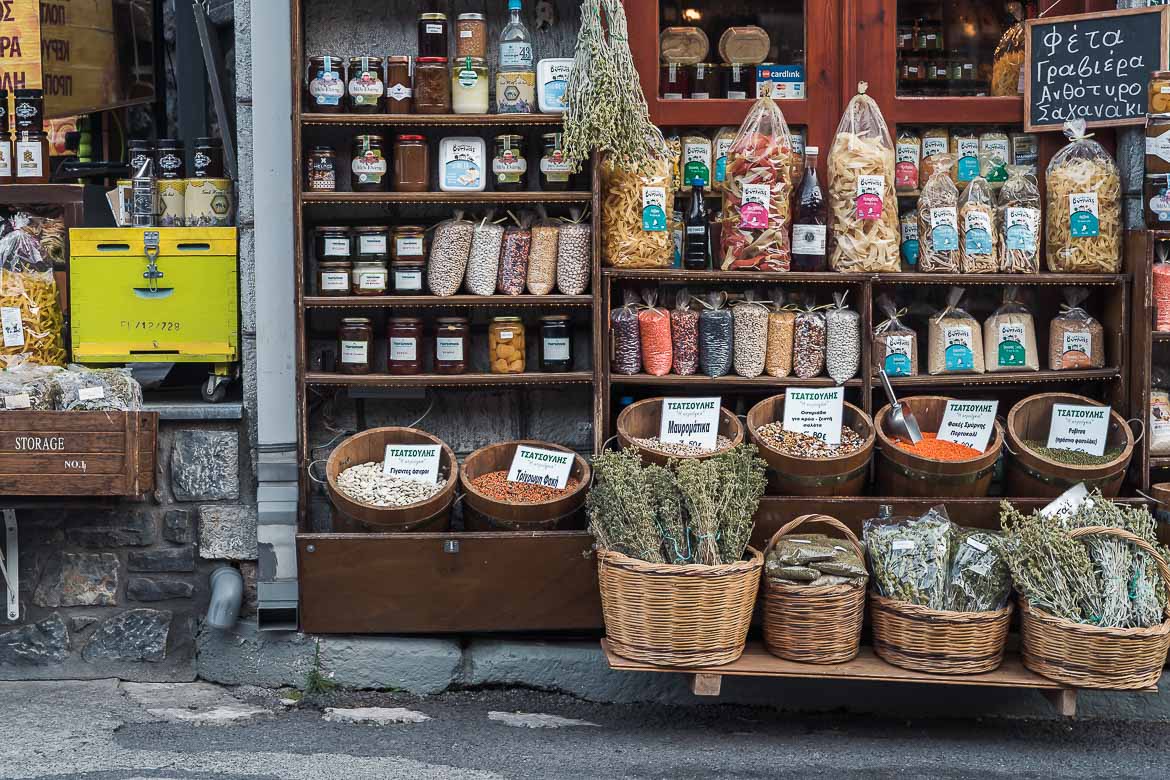
Greece Travel Inspiration
Top 3 Films Set in Greece
Top 3 Books Set in Greece
- It’s All Greek To Me by John Mole
- Zorba The Greek by Nikos Kazantzakis
- The Island by Victoria Hislop
Check out our full list of the best novels set in Greece!
If you’re planning a trip to Greece, we hope that this ultimate Greece Travel Guide can help you map out the Greek escape of your dreams!


